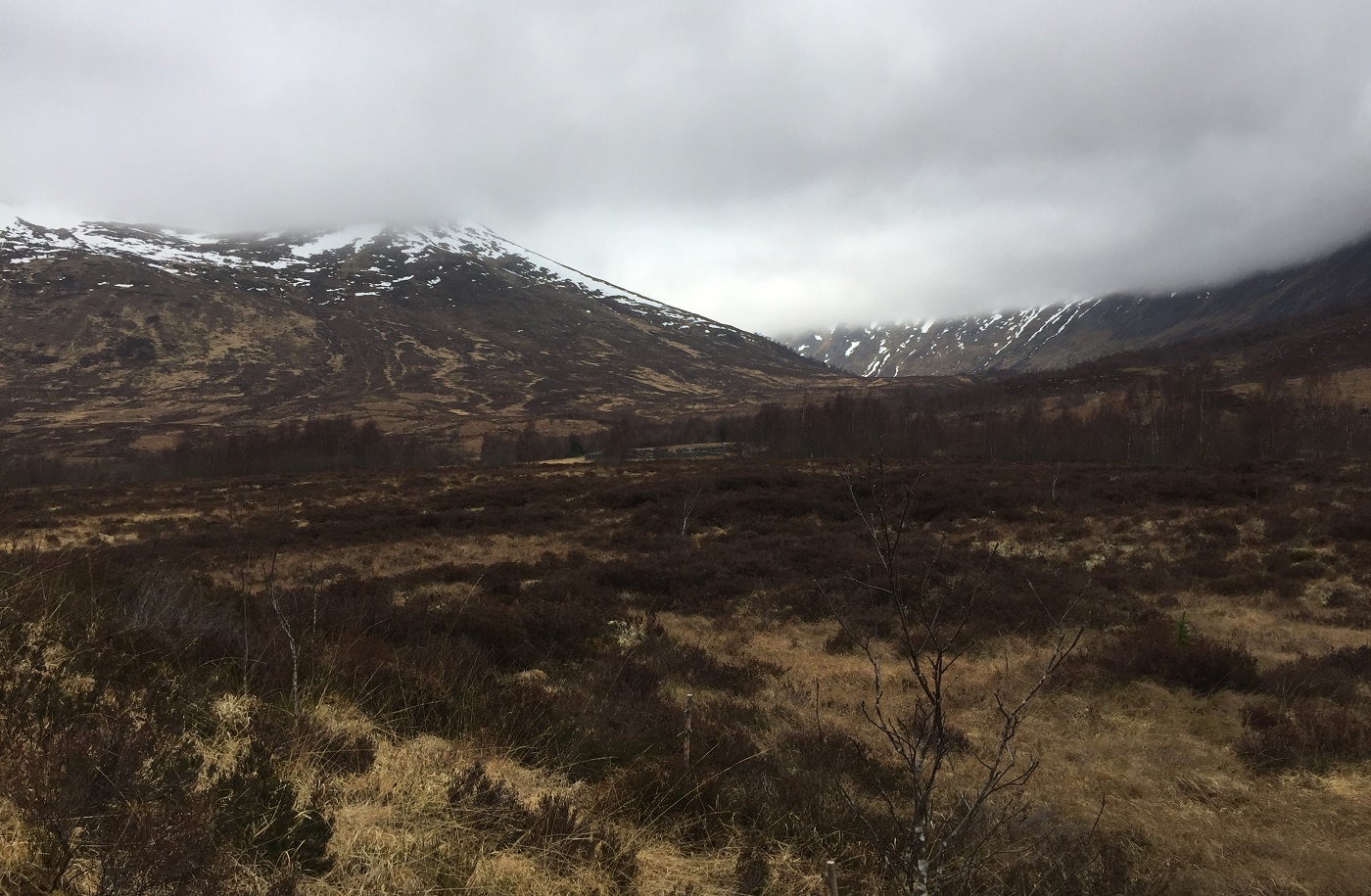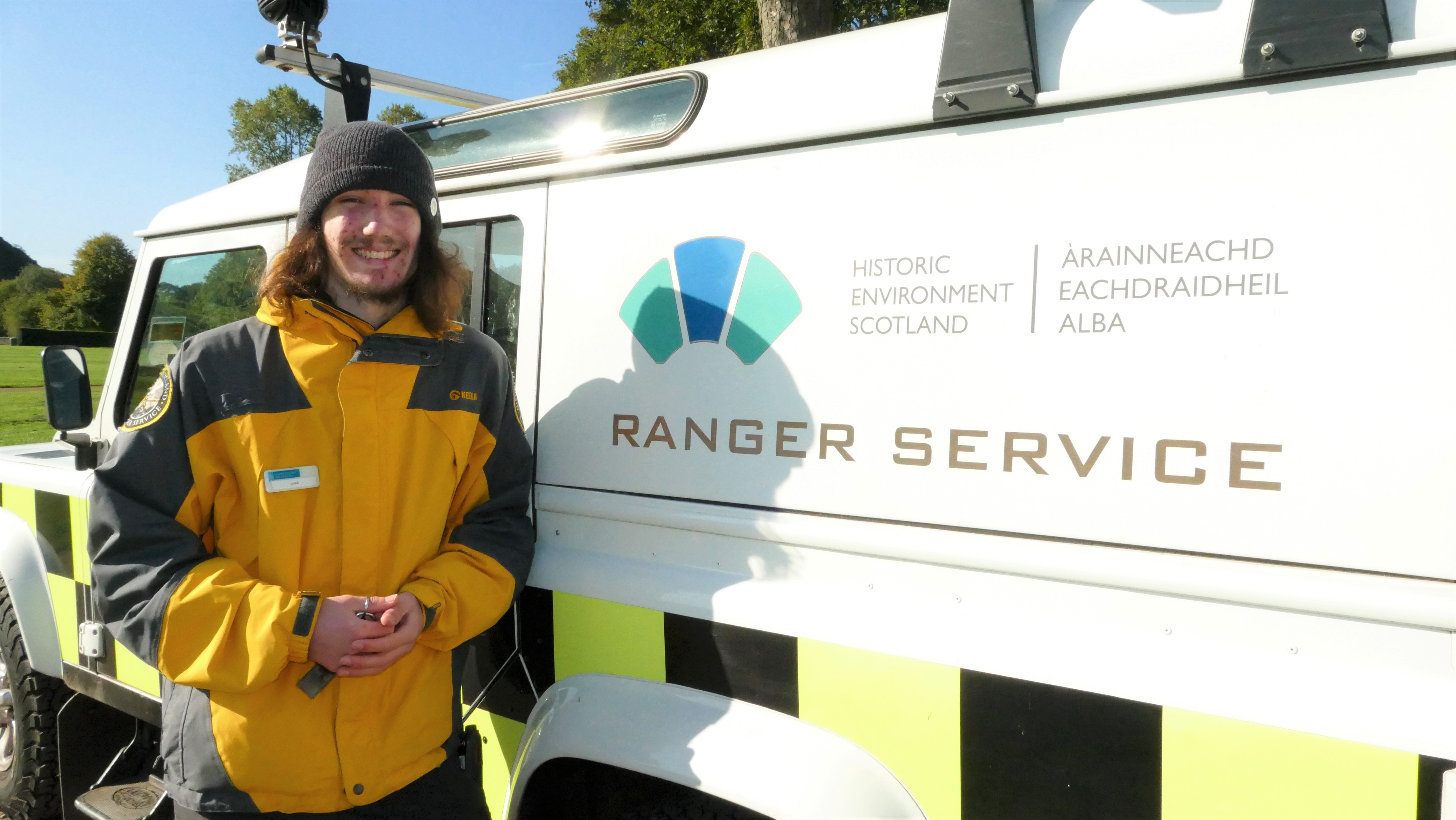

Hanna Rennie has always loved the outdoors, but her interest in countryside management and the environment only took root after she moved to Germany and started running bike trips for tourists.
While living in Berlin, she saw the pressures that hundreds of thousands of visitors were putting on the city every year and her concern for environmental matters grew.
At that point, she saw a Countryside Management course being advertised by SRUC Oatridge, and decided to change careers. After being accepted onto the course, she headed back to Scotland to start a new adventure, managing and protecting our wild places.
Hanna said: “I think working in tourism exposes you to the sharp end of environmentalism. When you see first-hand the impact we’re having on the natural world, it’s hard to ignore. Working in Germany, I began to think about what was happening back at home, particularly during lockdown when many more people were going out to the countryside. It’s great that we have the freedom to explore rural areas, but at the same time it has to be managed carefully.”
Two years after returning to Scotland, Hanna had completed an HND in Countryside Management, learning through course work and practical sessions and covering aspects of countryside management like pond dipping and dead heading plants. She also took up various volunteering roles, including a stint with Muiravonside Country Park near Falkirk, where she spent time shadowing a Countryside Ranger.
She said: “Our college tutors always encouraged us to look for volunteering work outside of the course, as it’s really important to put the theory you learn into practice. Volunteering also helps you network and build contacts that come in handy further down the line, not to mention building your self-confidence. Shadowing a Ranger at Muiravonside was a great experience. I was involved in a wide range of countryside management practices from coppicing, planting trees to river bed restoration and interpretation design. I even had the chance to lead some groups which was a real plus point for me.”
Hanna has now gone on to study for a Masters degree in Wildlife Management and Conservation, while looking for full-time work. She recently took on a part-time role as a Seasonal Ranger for Loch Lomond and the Trossachs National Park, where she undertook a series of conservation surveys on bats.
Hanna said: “For now it’s all about continuing my education and looking for a role that suits my interests and skill set. COVID has had a short-term impact on the availability of roles, but I’m sure there will be more vacancies by the beginning of next year. I’ve also taken an interest in the education side of countryside management. We’ve seen an influx of people during the lockdown period and this has put added pressure on rural areas. I’d be interested in exploring opportunities to talk to the public about how we can collectively look after the countryside better. There has also always been a bit of a social divide about access, so I’d like to help bridge that gap and make wild areas more accessible to more people.”
Senior Ranger at Holyrood Park Jamie Hamilton talks about his job with Historic Environment Scotland.
Julia Duncan works at Atholl Estates as a Countryside Ranger - here she is talking about her job and how much she enjoys doing it.
At the age of 19, Luke Taylor believes he has found his dream job as a countryside ranger, combining his passions of history, archaeology and working with people. The role looks to be perfect for a young man with aspirations to help protect and enhance green spaces, as well as educate the public on the rich history of some of our most iconic areas.
At the end of last year, Luke finished his first full contract as a ranger, working with Historic Environment Scotland at Holyrood Park and Linlithgow Palace.
Luke said: “Working at Holyrood was a fantastic experience and a real eye opener for me. The role is varied and each day presents a different challenge. We get over two million visitors every year, so there’s a lot of public engagement work, guiding people around the estate, explaining the history of the area and wildlife species that live nearby.
Conserving natural habitats and historical landmarks is also central to what we do, and part of the protection work involves educating people. Being able to engage and work effectively with visitors is a big part of being a good ranger.
I also do a lot of work with schools, youth groups and partner organisations who run special events at the park, and with blue light services providing security and medical support.”
Holyrood Park is host to some major events, including political and protest marches and the annual Ridings of the Marches, where 300 horse riders travel from East Lothian to Edinburgh. More recently, Historic Environment Scotland ran an event called Parkology where families could learn more about archaeology in the park, through guided walks and a mock archaeology dig. As Luke explains, the role of a ranger really comes into its own during these public engagements.
“Archaeology is one of my passions so learning more about the park’s ancient history during Parkology was great. From a ranger’s perspective, these kind of events also present challenges of park security and the public’s health and safety. We work closely with blue light services to protect the public and deal with any incidents, but there are still minor injuries and occasionally people go missing. Only two weeks into the job, I had to work with a group of 20 police officers to find a missing person on Arthur’s Seat. Luckily we found him, but it was quite an experience for a young ranger just starting out, and I hope I don’t have to do that too often.”
Luke started his career volunteering locally, before doing a Modern Apprenticeship in Environmental Conservation through West Lothian Council and SRUC for three years. The apprenticeship combined hands-on experience with college work, and Luke earned a wage while he learned, studying subjects like pathworks, health and safety, teamwork and communication.
Luke said: “The Modern Apprenticeship is a fantastic platform for people wishing to gain experience, while achieving their qualifications. It was a great stepping stone for me, giving me the confidence and skills I need to succeed as a ranger. I was also lucky enough to receive funding from West Lothian Council to study higher level modules in interpretation signage, history and archaeology and ecology and ecosystems. I need three more to compete the HNC which I’ll look to do in the near future.”
In addition to his role as a ranger, Luke has become an ambassador for his industry. After winning the Environmental Conservation category at Lantra Scotland’s learner of the year awards in 2019, he was chosen to represent the rural sector as an Industry Champion, travelling the country to talk to young people about career opportunities and his own experiences. Luke is also a Junior Ranger Award Ambassador for the Scottish Countryside Ranger Association, a scheme which gives young rangers experience and skills.
He said: “It’s been a real honour to represent the rural sector as an Industry Champion and Junior Ranger Award Ambassador. Rangers don’t have much of a voice, so this gives me the platform to share my passion and experiences. There’s also a shortage of rangers, so this has been a great way to raise our profile and get people interested in what we do. I’ve been lucky enough to speak at careers events at the Royal Highland Show, visit schools and meet some interesting people along the way. I’ve also learnt a lot about other rural industries and how they all interconnect. I think it’s important to consider the bigger picture and how our work affects other sectors and vice versa.”
The job of a Ranger is by its nature a seasonal role, with short-term contracts common. Luke is currently doing volunteer work as he seeks fresh opportunities.
“Employers tend to look for rangers to cover the busy summer period. In the meantime, I’m happy to volunteer locally for West Lothian Council, working in parks and public spaces near my home town. An unexpected benefit of working as a ranger in West Lothian is that I’ve learnt a lot about the history of my home town.
I would thoroughly recommend working as a Ranger to anyone who enjoys the outdoors and has a passion for conservation and history. It’s also an ideal job if you like engaging with people. I get to meet visitors from all round the world and all walks of life. There’s nothing better than sharing your passion with other people and see their eyes light up. I’m definitely someone who lives to work — my passion is my career, and I couldn’t be happier."
